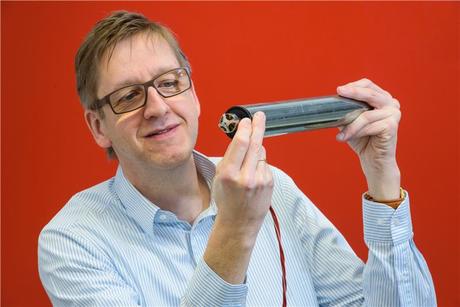Conveyor rollers with the smarts

Conveyor systems are ubiquitous in the food manufacturing industry, but how good would it be if conveyor rollers could communicate with each other and improve the speed and reliability with which goods are transported to their destinations?
Whether it’s a pallet load of beer crates or a can of soup on its way through the factory, roller conveyors are used to transport all manner of things from A to B. Roller conveyor systems often form part of production lines where items are moved from one machine to the next so that they can be filled, processed, sorted, distributed or simply transported safely to their destination. These systems represent a significant logistical challenge — one that involves the complex interplay of numerous subsystems and one where there is a lot that can go wrong. A fault with only a few of the thousands of conveyor rollers can lead to an entire production line grinding to a halt or to suitcases ending up in the wrong plane. Today’s roller conveyor systems are also restricted to predefined routes, making them quite inflexible as a result.
Now, a team of engineers led by Professor Matthias Nienhaus at Saarland University in Saarbrücken, as well as partners from Saarland University of Applied Sciences and industry, is developing smart conveyor rollers that can communicate with each other.
The team is working on a novel approach to the types of networked production systems envisaged in the Industry 4.0 framework. “Our focus is on the individual roller, which we equip with a drive motor and an intelligent controller. We are developing and testing methods that enable us to gather data from the drive motors,” explained Nienhaus.
Conveyor rollers that are smarter than you are
Drive systems specialist Nienhaus and his partners are turning the motor inside every drive roller into a sensor. When the conveyor is running, the drive motors continuously generate data, which allows the rollers to be precisely controlled and thus respond to changing operating conditions. These intelligent roller conveyor systems can identify new routes if a fault arises or can flag up certain conditions, such as when there is space in a box for more cans. The project is now so advanced that the partners are ready to test the system at a large distribution centre.
Who’s doing what
Nienhaus’ research is centred on the specialist field of miniature electromagnetic motors and microdrive systems with power ratings ranging from a tenth of a watt to several hundred watts. As the system under development does not require any additional sensors, such as position sensors, it is remarkably inexpensive. There is therefore no risk of sensitive sensors becoming damaged or becoming unable to generate a signal for some reason.
The researchers at Saarland University measure signals from specific locations in the motor, such as those that indicate the distribution of the magnetic field strength. An electromagnetic field is generated when electric current flows through the three coils located within the outer ring of rotating permanent magnets.
Knowing how this magnetic field varies when the motor rotates provides the engineers with detailed information about the drive. The measurement data is used by the research team to compute the position of the rotor and to infer important information about the performance of the motor. “By analysing this data, we are able to control the motor in a very efficient manner,” explained Nienhaus.
If one of the rollers is not rotating properly because the bearing is worn, or if a short circuit has knocked out one of the coils, the magnetic field generated by the motor will change and this will be immediately registered by the system.
“The data we gather enables us to detect even very small changes,” said Nienhaus. The system is able to detect any deterioration in the performance of a roller early on. The engineers perform calculations and experiments to determine how the measurement data correlates with specific motor states. The results are stored in the system’s ‘brain’ — a microcontroller that processes the data in real time.
The thousands of individual rollers in the roller conveyor system interact with one another via the network operating system that is integrated into each roller. The rollers can communicate with each other and can therefore respond flexibly whenever an unexpected condition arises. Unlike conveyor systems with a centralised external controller, each conveyor roller ‘knows’ by itself how to respond at any given time. This makes it possible to build roller conveyor systems that can do new things.
“By analysing angular momentum data, we can draw conclusions about the weight of a box currently being transported and decide whether or not another package could be added to the box,” explained Nienhaus.
“We want to develop the transport system to a stage where it can move freely on the ground,” he continued. He and his team are also working on ways to make the data even more reliable by computationally filtering out artefacts and interference effects.
In addition to Nienhaus’ group at the Laboratory of Actuation Technology at Saarland University, other project partners are Professor Martina Lehser from Saarland University of Applied Sciences, Wellgo Gerätetechnik (Nohfelden), HighTec EDV-Systeme (Saarbrücken) and Micronas (Freiburg).
The Federal Ministry of Education and Research (BMBF) has funded the project ‘Rolle’ to the tune of €4.2 million, of which around €500,000 was allocated to Saarland University.
Originally published here.
Irish drinks manufacturer takes its supply chain to the next level
A stainless steel vertical conveyor system has been incorporated into the final packaging process...
Voice technology used to transform cold storage operations
Dematic has implemented its Voice solution with gamified workflow features at two Australian...
Rock lobster exporter improves supply chain efficiency
Transport technology provider Microlise partners with rock lobster exporter in Western Australia...











